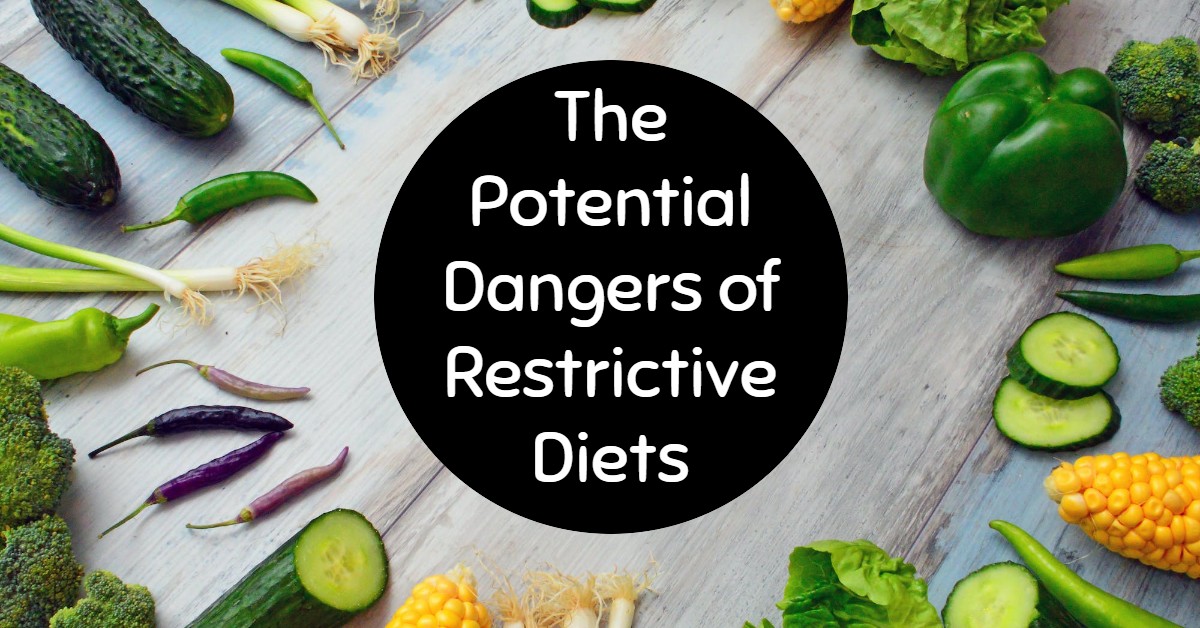The Potential Dangers of Restrictive Diets

The Potential Dangers of Restrictive Diets: The risks of limiting diets are the probable unfavorable effects on health brought on by sticking to an extremely limited diet.

Nutrient deficiencies, fatigue, low energy, dehydration, disordered eating behaviors, mood changes, muscle loss, slow metabolism, bone loss, gallstones, heart disease, malnutrition, eating disorders, increased stress, and weight cycling are just some of the risks associated with restrictive diets.
Inadequate calorie intake, insufficient intake of important nutrients like vitamins and minerals, limited food options, and psychological stress brought on by the restrictive nature of the diet all contribute to these risks.
Some restrictive diets may help you lose weight quickly, but they may not be healthy in the long run if they aren’t balanced and viable. To make sure a restrictive diet is healthy for you and will help you reach your objectives, it’s best to talk to a doctor before you start following it.
If you want to learn more about the dangers of restrictive diets, read on.
What are Restrictive Diets?
Restrictive diets refer to any type of eating pattern or regimen that involves limiting or excluding certain foods or food groups from one’s diet. This can be for a variety of reasons, including weight loss, religious or cultural beliefs, health reasons, or personal preference. Examples of restrictive diets include low-carbohydrate diets, low-fat diets, vegan or vegetarian diets, gluten-free diets, and the popular “fad” diets such as the Atkins diet or the South Beach diet.
While restrictive diets may result in short-term weight loss, they can also be harmful if they are not balanced and sustainable, as they may lead to nutrient deficiencies, disordered eating behaviors, and other health problems. It is important to consult a healthcare professional before starting any restrictive diet to ensure it is appropriate and safe for individual needs and goals.
According to the U.S. Department of Health and Human Services, restrictive diets, such as low-calorie diets, are difficult to maintain in the long term. For this reason, their popularity has decreased compared to non-restrictive approaches, which instead promote healthy eating strategies.
The Potential Dangers of Restrictive Diets: FAQs & Answers
Can restrictive diets lead to nutrient deficiencies?
Yes, restrictive diets can lead to nutrient deficiencies if they do not provide adequate amounts of essential nutrients, such as vitamins, minerals, and macronutrients like protein and healthy fats.
Are all restrictive diets dangerous?
Not all restrictive diets are dangerous, but extreme or overly restrictive diets can pose risks to health.
How can I avoid the dangers of restrictive diets?
To avoid the dangers of restrictive diets, it is important to adopt a balanced and sustainable approach to eating that includes a variety of nutrient-dense foods and avoids overly restrictive or extreme diets. Seeking guidance from a qualified healthcare professional or a registered dietitian can also be helpful in ensuring that dietary changes are safe and appropriate for individual needs and goals.
15 Potential Dangers Of Restrictive Diets
1. Nutrient Deficiencies
Restrictive diets can lead to nutrient deficiencies, as they often limit the variety and quantity of foods consumed, resulting in inadequate intake of essential nutrients such as vitamins, minerals, and fiber.
2. Weakened Immune System
Following a restrictive diet can weaken the immune system and increase the risk of infections and illnesses. The immune system relies on a range of nutrients to function properly, including vitamins A, C, and E, as well as zinc and iron.
Restrictive diets may limit the intake of certain food groups, resulting in insufficient intake of these nutrients and other essential components of a healthy diet. In particular, low-calorie diets and diets that eliminate entire food groups may increase the risk of nutrient deficiencies and compromise immune function.
3. Fatigue and Low Energy
Following a restrictive diet can lead to fatigue and low energy levels, which can negatively impact daily activities and overall quality of life.
One of the main causes of fatigue and low energy on restrictive diets is inadequate caloric intake. Many restrictive diets limit the number of calories consumed each day, which can leave individuals feeling tired and sluggish. When the body does not receive enough energy from food, it must rely on stored energy reserves, which can lead to fatigue and decreased physical and mental performance.
4. Dehydration
When the body is dehydrated, it can lead to a range of symptoms, including thirst, dry mouth, headache, dizziness, and fatigue. Severe dehydration can also cause muscle cramps, rapid heartbeat, and even unconsciousness.
Restrictive diets can lead to dehydration because they may limit the intake of fluids, particularly water. In addition, certain foods and drinks that are restricted on some diets, such as caffeine or alcohol, can act as diuretics and increase fluid loss from the body.
5. Disordered Eating
Restrictive diets can trigger disordered eating behaviors such as binge eating, purging, or excessive exercise, which can lead to long-term health consequences.
6. Mood Changes
Restrictive diets can lead to mood changes such as irritability, anxiety, and depression due to insufficient intake of essential nutrients.
7. Muscle Loss
Restrictive diets can result in muscle loss due to inadequate protein intake, which can negatively impact physical performance and overall health.
8. Slow Metabolism
Restrictive diets can slow down metabolism, making it more difficult to lose weight in the long term.
9. Bone Loss
Restrictive diets can increase the risk of bone loss and osteoporosis, particularly those that severely restrict calories or certain food groups, such as dairy or protein.
When the body is not getting enough calories or nutrients, it can begin to break down bone tissue to release stored minerals, such as calcium, into the bloodstream. Over time, this can lead to a decrease in bone density and an increased risk of fractures and other bone-related health issues.
To prevent bone loss on a restrictive diet, it is important to ensure adequate intake of calcium, vitamin D, and other bone-building nutrients. This can be achieved through a balanced and varied diet that includes a variety of nutrient-dense foods, as well as through supplementation if necessary. It is also important to engage in weight-bearing exercises, such as strength training or jogging, to promote bone health and density.
10. Gallstones
Gallstones grow in the gallbladder, a small organ beneath the liver that digests fats. Fast-weight-loss diets may raise gallstone risk. Rapid weight loss alters bile composition and increases gallstone risk. Because the liver produces and stores bile in the gallbladder, body weight can impact bile cholesterol and other substances.
High-protein, low-fiber meals can also cause gallstones. High-protein diets increase the concentration of certain substances in the bile, while low-fiber diets lower bile acids in the digestive system, increasing the risk of gallstone formation.
11. Heart Disease
Restrictive diets can increase the risk of heart disease due to high levels of saturated fat and cholesterol in some low-carbohydrate diets.
12. Malnutrition
Restrictive diets can result in malnutrition, which can lead to a range of health problems, including impaired immune function, poor wound healing, and delayed growth and development in children.
13. Eating Disorders
Restrictive diets can increase the risk of developing eating disorders, such as anorexia nervosa, bulimia nervosa, and binge eating disorder. This is because restrictive diets often promote an unhealthy relationship with food, focusing on rules and restrictions rather than balanced and intuitive eating habits.
Individuals on restrictive diets may become overly preoccupied with food, leading to obsessive thoughts and behaviors, such as counting calories, weighing food, or avoiding certain food groups altogether. These behaviors can trigger feelings of guilt, shame, and anxiety, which can further perpetuate disordered eating patterns.
14. Increased Stress
Restrictive diets can increase stress levels due to the psychological and physical strain of following a highly restrictive eating pattern.
15. Weight Cycling
This is a common phenomenon that occurs on restrictive diets, particularly those that involve rapid weight loss followed by weight gain.
Weight cycling is the repeated loss and regaining of body weight over time, often due to the cyclical nature of dieting.
Restrictive diets can contribute to weight cycling by promoting rapid weight loss, which can lead to a reduction in metabolism and a rebound effect in which weight is regained once the diet is over. This cycle of weight loss and regain can be frustrating and discouraging, leading individuals to try increasingly restrictive diets in an attempt to lose weight.
Conclusion
In conclusion, restrictive diets can be dangerous to both physical and mental health due to the numerous risks they pose, including a weakened immune system, fatigue, low energy, dehydration, eating disorders, weight cycling, gallstones, and bone loss.
To avoid these risks, it is important to adopt a balanced and sustainable approach to eating that includes a variety of nutrient-dense foods and avoids overly restrictive or extreme diets. It is also important to seek guidance from a qualified healthcare professional or registered dietitian if necessary to ensure that dietary changes are safe and appropriate for individual needs and goals.
Additionally, engaging in regular physical activity and focusing on self-care practices can also promote overall health and well-being.
That is all on the potential dangers of restrictive diets. We hope you found this information helpful. Do well to share it with others. Thank you.
Recommended:
The Pros and Cons of Popular Diets (2023 Review)
How to Lose Face Fat (11 Natural and Stress-free Methods)
15 Tips to Prevent Blood Sugar Spikes (Complete Guide 2023)
11 Ways To Gain Healthy Weight Fast Naturally (2023 Guide)




